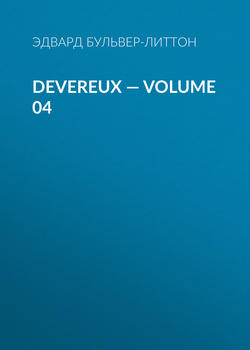Читать книгу Devereux — Volume 04 - Эдвард Джордж Бульвер-Литтон, Эдвард Бульвер-Литтон - Страница 3
BOOK IV CHAPTER III
ОглавлениеTHE REAL ACTORS SPECTATORS TO THE FALSE ONES
IT was a brilliant night at the theatre. The boxes were crowded to excess. Every eye was directed towards Lord Bolingbroke, who, with his usual dignified and consummate grace of manner, conversed with the various loiterers with whom, from time to time, his box was filled.
"Look yonder," said a very young man, of singular personal beauty, "look yonder, my Lord, what a panoply of smiles the Duchess wears to-night, and how triumphantly she directs those eyes, which they say were once so beautiful, to your box."
"Ah," said Bolingbroke, "her Grace does me too much honour: I must not neglect to acknowledge her courtesy; "and, leaning over the box, Bolingbroke watched his opportunity till the Duchess of Marlborough, who sat opposite to him, and who was talking with great and evidently joyous vivacity to a tall, thin man, beside her, directed her attention, and that of her whole party, in a fixed and concentrated stare, to the imperilled minister. With a dignified smile Lord Bolingbroke then put his hand to his heart, and bowed profoundly; the Duchess looked a little abashed, but returned the courtesy quickly and slightly, and renewed her conversation.
"Faith, my Lord," cried the young gentleman who had before spoken, "you managed that well! No reproach is like that which we clothe in a smile, and present with a bow."
"I am happy," said Lord Bolingbroke, "that my conduct receives the grave support of a son of my political opponent."
"/Grave/ support, my Lord! you are mistaken: never apply the epithet grave to anything belonging to Philip Wharton. But, in sober earnest, I have sat long enough with you to terrify all my friends, and must now show my worshipful face in another part of the house. Count Devereux, will you come with me to the Duchess's?"
"What! the Duchess's immediately after Lord Bolingbroke's!—the Whig after the Tory: it would be as trying to one's assurance as a change from the cold bath to the hot to one's constitution."
"Well, and what so delightful as a trial in which one triumphs? and a change in which one does not lose even one's countenance?"
"Take care, my Lord," said Bolingbroke, laughing; "those are dangerous sentiments for a man like you, to whom the hopes of two great parties are directed, to express so openly, even on a trifle and in a jest."
"'Tis for that reason I utter them. I like being the object of hope and fear to men, since my miserable fortune made me marry at fourteen, and cease to be aught but a wedded thing to the women. But sup with me at the Bedford,—you, my Lord, and the Count."
"And you will ask Walpole, Addison, and Steele,5 to join us, eh?" said Bolingbroke. "No, we have other engagements for to-night; but we shall meet again soon."
And the eccentric youth nodded his adieu, disappeared, and a minute afterwards was seated by the side of the Duchess of Marlborough.
"There goes a boy," said Bolingbroke, "who, at the age of fifteen, has in him the power to be the greatest man of his day, and in all probability will only be the most singular. An obstinate man is sure of doing well; a wavering or a whimsical one (which is the same thing) is as uncertain, even in his elevation, as a shuttlecock. But look to the box at the right: do you see the beautiful Lady Mary?"
"Yes," said Mr. Trefusis, who was with us, "she has only just come to town. 'Tis said she and Ned Montagu live like doves."
"How!" said Lord Bolingbroke; "that quick, restless eye seems to have very little of the dove in it."
"But how beautiful she is!" said Trefusis, admiringly. "What a pity that those exquisite hands should be so dirty! It reminds me" (Trefusis loved a coarse anecdote) "of her answer to old Madame de Noailles, who made exactly the same remark to her. 'Do you call my hands dirty?' cried Lady Mary, holding them up with the most innocent /naivete/. 'Ah, Madame, /si vous pouviez voir mes pieds!'"
"/Fi donc/," said I, turning away; "but who is that very small, deformed man behind her,—he with the bright black eye?"
"Know you not?" said Bolingbroke; "tell it not in Gath!—'tis a rising sun, whom I have already learned to worship,—the young author of the 'Essay on Criticism,' and 'The Rape of the Lock.' Egad, the little poet seems to eclipse us with the women as much as with the men. Do you mark how eagerly Lady Mary listens to him, even though the tall gentleman in black, who in vain endeavours to win her attentions, is thought the handsomest gallant in London? Ah, Genius is paid by smiles from all females but Fortune; little, methinks, does that young poet, in his first intoxication of flattery and fame, guess what a lot of contest and strife is in store for him. The very breath which a literary man respires is hot with hatred, and the youthful proselyte enters that career which seems to him so glittering, even as Dame Pliant's brother in the 'Alchemist' entered town,—not to be fed with luxury, and diet on pleasure, but 'to learn to quarrel and live by his wits.'"
The play was now nearly over. With great gravity Lord Bolingbroke summoned one of the principal actors to his box, and bespoke a play for the next week; leaning then on my arm, he left the theatre. We hastened to his home, put on our disguises, and, without any adventure worth recounting, effected our escape and landed safely at Calais.
5
All political opponents of Lord Bolingbroke.
